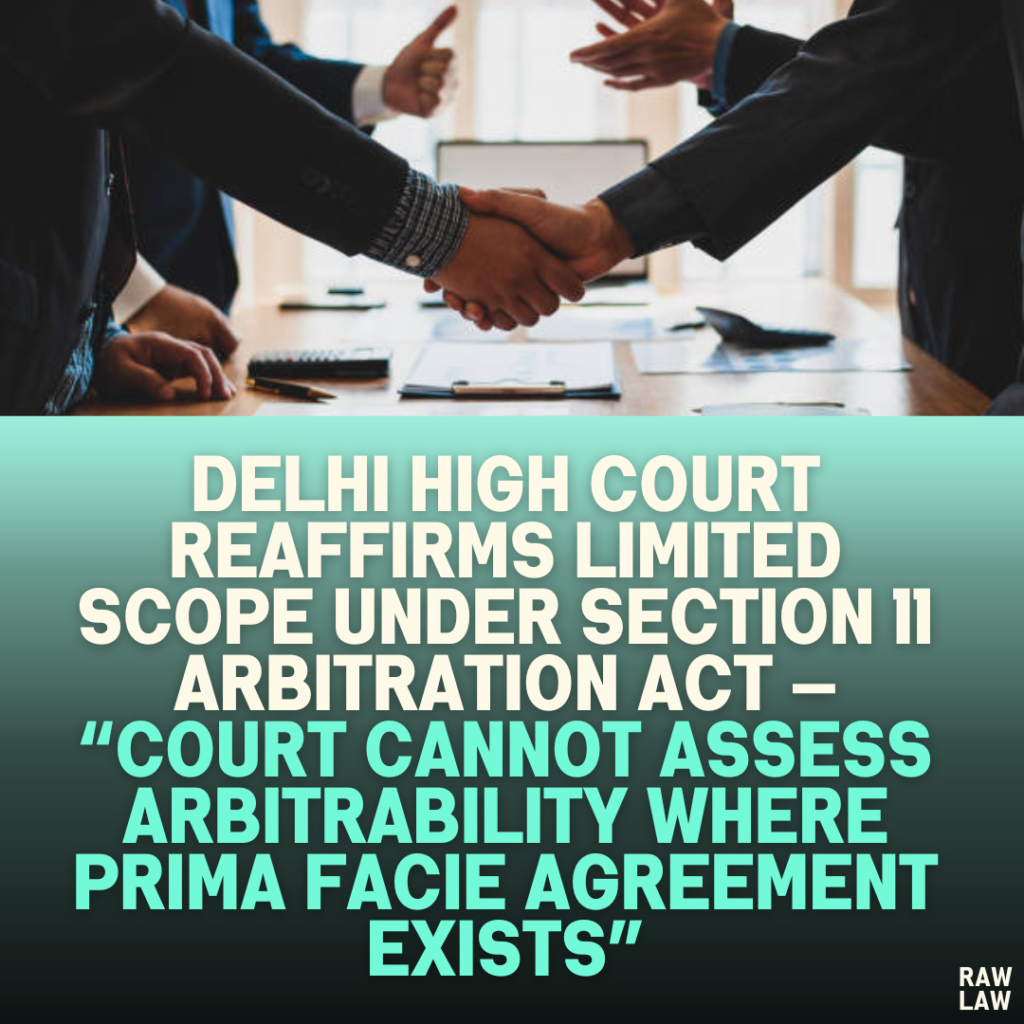Court’s Decision
The Delhi High Court allowed the petition under Section 11(6) of the Arbitration and Conciliation Act, 1996 and appointed Justice (Retd.) L. Nageswara Rao as the Sole Arbitrator to adjudicate the disputes. The Court held that once a prima facie arbitration agreement exists, it is impermissible for the referral court to assess arbitrability or delve into disputed issues of liability. All objections raised by the respondent, including those regarding arbitrability and jurisdiction, were left open for the arbitrator to decide under Section 16 of the A&C Act.
Facts
The petitioner was issued a Standard Fire and Special Perils Policy by the respondent covering building, machinery, furniture, and stocks for a period from 13.01.2022 to 12.01.2023. A fire occurred on the night of 23–24 February 2022, after which a final survey report was submitted on 22.09.2023. However, the insurer repudiated the claim via letter dated 20.05.2024. The petitioner, contending the repudiation as unlawful and violative of Supreme Court judgments, issued an arbitration notice dated 17.08.2024 invoking the arbitration clause in the policy. Receiving no response, the petitioner filed the present Section 11 petition.
Issues
- Whether the Court can appoint an arbitrator where the insurer has repudiated liability under the policy.
- Whether the arbitration clause is valid and enforceable despite the repudiation.
- Whether issues of arbitrability can be decided at the Section 11 stage.
Petitioner’s Arguments
- The arbitration clause is valid, and repudiation cannot defeat the invocation of arbitration.
- Cited recent judgments including:
- SBI General Insurance Co. Ltd. v. Krish Spinning (2024)
- Payu Payments Pvt. Ltd. v. New India Assurance Co. Ltd. (2024)
- Lombardi Engineering Ltd. v. Uttarakhand Jal Vidyut Nigam Ltd. (2024)
- Argued that under current jurisprudence, the referral court must confine itself to the prima facie existence of an arbitration agreement and not delve into arbitrability or merits.
- Submitted that even if the arbitration clause prescribes that disputes on quantum alone are arbitrable post-admission of liability, such restrictive conditions may be unconstitutional under Article 14.
Respondent’s Arguments
- The arbitration clause was not attracted since the insurer had denied liability, and under precedents like Oriental Insurance Co. v. Narbheram Power (2018) and United India Insurance Co. v. Hyundai Engineering (2018), such clauses are only activated once liability is admitted.
- Argued that repudiation precludes arbitration as the clause applies only to quantum disputes.
- Sought support from the English decision in DC Bars Ltd. v. QIC Europe [2023] EWHC 245 (Comm), which upheld narrow reading of similarly worded arbitration clauses.
- Distinguished the petitioner’s reliance on Lombardi Engineering, stating that case dealt with pre-deposit clauses, not denial of liability.
Analysis of the Law
The Court held that the arbitration clause did not contain any express negative language excluding arbitration in cases of denied liability, unlike earlier Supreme Court decisions. Therefore, it could not be strictly construed to bar arbitration. The Court cited multiple precedents that have evolved the scope of enquiry under Section 11, particularly:
- SBI General Insurance Co. Ltd. v. Krish Spinning: Referral courts cannot assess arbitrability.
- Interplay between Arbitration and Stamp Act (2024) 6 SCC 1: Referral court must restrict inquiry to existence of arbitration agreement.
- Chloro Controls v. Severn Trent, Govind Rubber Ltd., MTNL v. Canara Bank: Favour broad construction of arbitration clauses.
Precedent Analysis
- The Court distinguished Narbheram Power and Hyundai Engineering, noting that those cases dealt with clauses containing express language excluding arbitration unless liability was admitted.
- Relied on the judgment in Payu Payments Pvt. Ltd. (2024), which applied the post-Krish Spinning jurisprudence and held that issues of arbitrability must be decided by the tribunal, not the referral court.
- Cited Lombardi Engineering to emphasize that arbitration clauses cannot be applied in a way that permits arbitrary evasion of dispute resolution.
Court’s Reasoning
The Court emphasized that modern arbitration jurisprudence favors minimal judicial interference and broader construction of arbitration clauses. It observed:
“It is now impermissible for a Section 11 Court to dwell on the issues of ‘arbitrability’ or the scope of the arbitration agreement.”
It held that even if an interpretative exercise were required to determine if the claim was arbitrable, such exercise must be left to the arbitrator.
Conclusion
The Court appointed a Sole Arbitrator and clarified:
- All objections regarding arbitrability and jurisdiction are left open for the arbitrator.
- The order does not reflect any view on merits of the case.
- The arbitrator must furnish disclosures as per Section 12 of the A&C Act.
Implications
This judgment reinforces the evolving jurisprudence under Section 11 of the A&C Act, confirming that the referral court’s inquiry is limited to the prima facie existence of an arbitration agreement. It signals that insurers cannot avoid arbitration merely by repudiating claims and that disputes must be resolved by the arbitral tribunal, ensuring that the party autonomy and the objective of expeditious dispute resolution through arbitration are upheld.



![Bombay High Court Remands Appeals to Commissioner of Income Tax (Appeals) [CIT(A)] in Transponder Royalty Dispute: “Absence of Foundational Facts and Agreement Analysis Makes All Orders Non-Speaking” 3 Bombay High Court Remands Appeals to Commissioner of Income Tax (Appeals) [CIT(A)] in Transponder Royalty Dispute: “Absence of Foundational Facts and Agreement Analysis Makes All Orders Non-Speaking”](https://rawlaw.in/wp-content/uploads/2025/05/White-Minimalist-Economics-Headline-News-Instagram-Post-1-10-96x96.png)